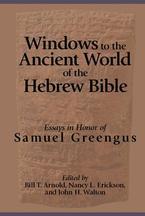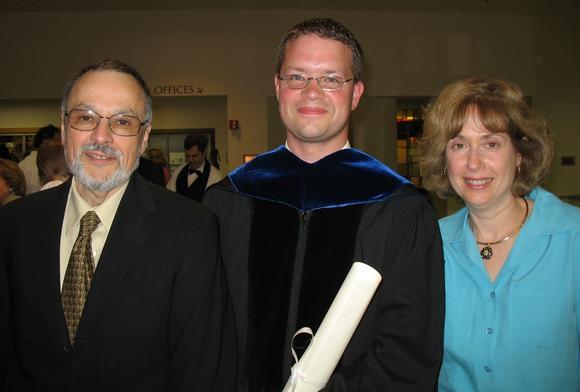I want to recommend a recent book that brings honor to one of my teachers, Rabbi and Professor Samuel Greengus from Hebrew Union College—Jewish Institute of Religion. It is called Windows to the Ancient World of the Hebrew Bible: Essays in Honor of Samuel Greengus (Winona Lake: Eisenbrauns, 2014), and it is edited by Bill Arnold, Nancy Erickson and John Walton.

This festschrift has twenty-one contributors, all of which were doctoral students of Dr. Greengus and were invited to submit chapters (see below for the table of contents). The topics of the chapters are quite varied and attest to the breadth of Dr. Greengus’ interests and scholarship: he is equally at home in biblical texts as he is in rabbinic or Mesopotamian texts. He advised around fifty doctoral dissertations by students of various faith traditions over the course of five decades. In my own case, Dr. Greengus taught me an array of courses (on Sumerian, Akkadian, Hebrew Bible and ancient Near Eastern History) and served as second reader on my dissertation. In the photo below, I am standing proudly at my graduation (in spring 2006) with my doctoral committee—first reader, Dr. Nili Fox (right), and second reader, Dr. Samuel Greengus (left).

My favorite feature of this volume is that each contributor included a personal remark about Dr. Greengus at the beginning of his/her essay. In my essay, I remarked: “It is a great personal honor to offer this study as a tribute to my teacher, Professor Samuel Greengus. His indelible impact extends not only to my formation as a scholar (in the study of biblical and cuneiform texts and in the completion of my dissertation, Donkeys in the Biblical World) but also to the formation of my character as he consistently modeled extraordinary wisdom with humility in his pedagogy” (p. 247).
The book can be purchased here. Here is the published description of the volume:
This honorary volume of scholarly essays celebrates Dr. Samuel Greengus, Julian Morgenstern Professor of Bible and Near Eastern Literature and Professor of Semitic Languages at Hebrew Union College–Jewish Institute of Religion, esteemed teacher and mentor.
The contributions are varied in scope, including studies of biblical texts and the ancient Near East. Together, the essays demonstrate the rich and vast field that is the study of the Hebrew Bible and thus highlight the profound and broad influence that Samuel Greengus has had on multiple generations of students, now scholars in a field that he has helped shape. Windows to the Ancient World of the Hebrew Bible is sure to delight the reader and holds unique importance for students of the Hebrew Bible and ancient Near East. It presents innovative research and heralds fine scholarship, representative of an even finer scholar.
And here is the TABLE OF CONTENTS:
A Colleague’s Appreciation —Nili S. Fox
A Student’s Appreciation —Richard S. Hess
Publications by Dr. Samuel Greengus
Law, Economy, Academia, and Divination in Bronze Age Canaan: The Value of the Cuneiform Tablets Discovered at Tel Hazor—Stephen J. Andrews
The Holiness Redaction of the Flood Narrative (Gen 6:9–9:29) —Bill T. Arnold
Isaiah 47 and 54: An Investigation into a Case of Intertextuality—Bryan E. Beyer
The Tenth Commandment and the Concept of “Inward Liability”—Aurelian Botica
The Book of Giants and the Greek Gilgamesh—Jeffrey L. Cooley
Donning the Right Garb: The Egyptian Ritual of “Opening the Mouth” and the Biblical Regulations in Exodus 28–29—Nancy L. Erickson
Mythologizing Exile: Life, Law, and Justice after the Flood—Angela Roskop Erisman
The Hebrew Syllable: Definition and Practical Application—Russell Fuller
Neither Slave Nor Free: Children Living on the Edge of a Social Status—Kristine Henriksen Garroway
The Administration of Copper Tools at Umma in the Ur III Period—Charles Halton
Rabbi Joshua Briskin’s Tav Y’hoshua: Yalkut Derekh Ereẓ, A Handbook for Busy Jews —Rabbi Barton Lee
The Changing Face of Victory—R. Russell Mack
Zêru, “to Hate” as a Metaphor for Covenant Instability—Andrew J. Riley
With Mace in Hand . . . and Praise in Throat: Comparisons and Contrasts in the Bookends of the Psalter—Tim Undheim
Do Deities Deceive?—Ronald A. Veenker
Toward an Ethic of Liberation for Bible Translation: A Work in Progress —Steven Voth
Demons in Mesopotamia and Israel: Exploring the Category of Non-Divine but Supernatural Entities—John H. Walton
The Literary Structure of Judges Revisited: Judges as a Ring Composition—Kenneth C. Way
The Perfect Verb and the Perfect Woman in Proverbs—Brian L. Webster
 Biola University
Biola University
.jpg)


.jpg)